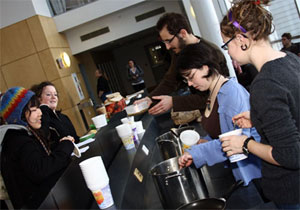 |
| Members of SustainDAL get ready for Tupperware Tuesday in the McCain Building. (Bruce Bottomley Photo) |
Going Green doesn’t mean sacrificing your old lifestyle; it’s the simple things that can make the largest impacts, like shutting off your computer’s power bar at night or walking to campus instead of driving.
SustainDAL is an action-oriented student group that’s all about promoting eco-sustainability on campus. Maggie Lovett, a member of the group, has a simple and reassuring message: “It’s all about making small changes.”
The biology major heads a Muggy Monday campaign at the Dal SUB each Monday morning. “Every Monday we provide free fair trade organic coffee and tea to anyone that comes by with a mug,” she explains.
Ms. Lovett got the idea during her first year at the University of Ottawa. When she transferred to Dal, she pitched the idea at her first SustainDAL meeting.
Every Monday morning you can find Ms. Lovett serving up the organic fair-trade coffee to anyone who brings along their own mug. The coffee is donated by Java Blend, and the tea is from Just Us.
Ben Langer, on the other hand, is busy on Tuesdays. That’s when he serves up locally grown and organic food to students on a pay-what-you-can basis--permitting you bring your own Tupperware of course.
The weekly event is appropriately titled, Tupperware Tuesdays. “I was inspired by a group at Concordia called the People’s Potato. They’re able to offer vegan food on a pay-what-you-can basis to 500-plus people every day,” says Mr. Langer.
“We cook every Tuesday morning at the Dal Women’s Centre and bring the food to the McCain Building.”
The food is donated from Home Grown Organic. All of the proceeds from the week’s donations go back into funding various food items for the next week.
But Gillian Pritchard, also a member of SustainDAL, proposes going even further on the sustainability front by removing plastic water bottles in vending machines and at cafeterias on campus.
Ms. Pritchard, a major in health promotion, says improving water fountains on campus is a much more viable alternative to plastic water bottles, stemming from the fact that manufacturing plastic containers consumes energy and creates pollution. “We really want to improve the water fountains on campus to give students more of a choice.”
Ms. Pritchard conducted research at the end of October and assessed water fountains on campus for taste, temperature, pressure and wheelchair accessibility.
Ms. Pritchard organized the data and developed a report of general trends, which she is taking to Facilities Management.
“A master’s student group did a project on the feasibility. And one of their main findings was we’ve got to improve water fountains for it to actually be feasible,” she says.
Adopting a green lifestyle can seem overwhelming at times but as SustainDAL proves, it doesn’t mean sacrificing your old life style – it’s all about the little things.
As for the other days in the week, members of the group joke, “we’ll have to come up with something starting with a W, T, and F.”
What do you think about banning water bottles on campus? Join the discussion.
